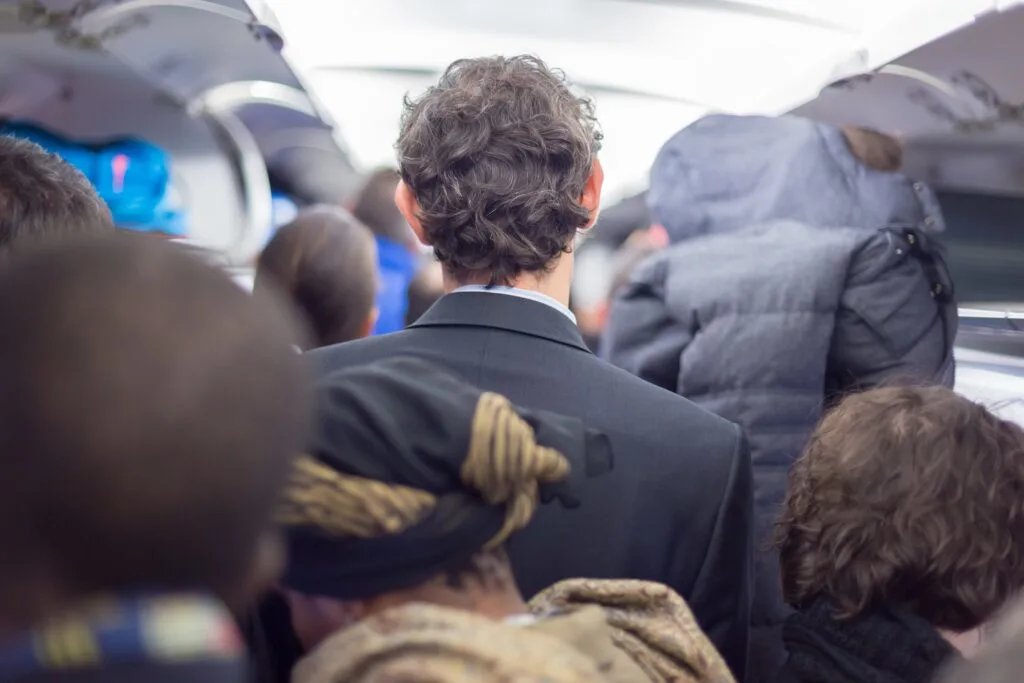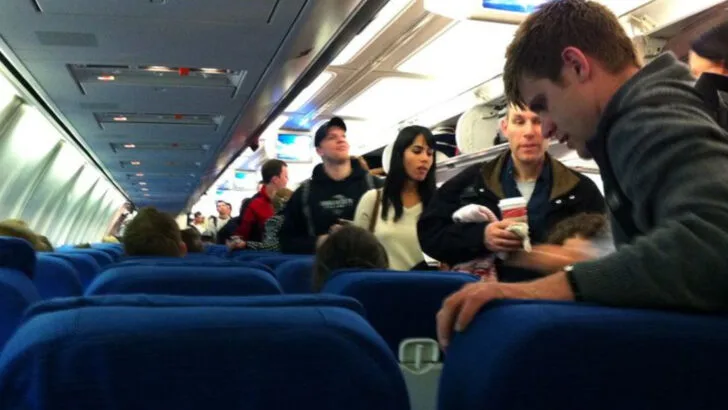Air travel is stressful enough—don’t make it worse by being that passenger. Flight attendants see it all, and trust me, they have a list of habits that drive them absolutely crazy. From ignoring simple instructions to treating the aisle like your personal yoga studio, some travelers forget they’re sharing a small metal tube with hundreds of others. And yes, the crew notices every little thing. These aren’t just petty complaints, either. Many of these behaviors make flights less safe, less comfortable, and a whole lot more irritating for everyone on board. So before you buckle up for your next trip, take a peek at the biggest passenger faux pas. Because if flight attendants could make just one wish, it would be for travelers to stop doing these 13 things—once and for all.
Standing in the aisle while others are still boarding
Standing in the aisle during boarding can be frustrating for everyone. It blocks the flow of passengers trying to find their seats. Keep your belongings organized and step into your row quickly. Consider how your actions affect others trying to board efficiently. This bottleneck can lead to delays, adding unnecessary stress to the flight crew’s tasks. Make it a habit to move out of the way promptly. Ensuring a smooth boarding process is beneficial for everyone. Flight attendants appreciate passengers who are mindful of this simple yet impactful act.
Taking off shoes and socks
Bare feet on an airplane is a no-go for many reasons. Hygiene is a top concern; the cabin floor isn’t as clean as you might think. Respect the shared space and keep your shoes on to maintain a pleasant environment. Cabin temperatures can vary, and keeping your feet covered can prevent discomfort. Consider how bare feet might be perceived by others. Flight attendants often have to address complaints from other passengers. Keeping your shoes on shows respect and awareness for your fellow travelers’ comfort.
Pressing the call button unnecessarily
The call button is there for emergencies or necessary assistance. Using it frivolously can distract flight attendants from essential tasks. Before pressing, consider if your request can wait. Flight attendants prioritize safety and efficiency, and unnecessary interruptions can hinder their responsibilities. A polite wave or waiting for them to pass by might suffice. Utilizing the call button only when essential helps maintain smooth operations. Flight attendants appreciate passengers who understand the importance of their time and tasks. It’s a small courtesy that goes a long way.
Asking for things during turbulence
Turbulence can be unnerving, but it’s crucial to stay seated and buckled. Flight attendants are trained to manage the cabin during these moments. Avoid asking for service when the seatbelt sign is on. Safety is their priority, and moving around increases risk. Try to anticipate needs before turbulence begins. A little patience ensures everyone’s safety and comfort. Flight attendants navigate challenging conditions to keep passengers secure. Understanding the importance of staying seated helps in maintaining calm during bumpy flights.
Snapping fingers or waving to get attention
Politeness goes a long way on a flight. Snapping fingers or waving is often considered disrespectful. Flight attendants deserve the same courtesy as any service professional. Using manners to get their attention shows respect and understanding. Try making eye contact or waiting for them to approach. This simple act of kindness can enhance the overall atmosphere. Flight attendants appreciate passengers who communicate with politeness and patience. It’s an easy way to contribute to a pleasant flight experience for everyone involved.
Leaving headphones on during drink service
Headphones can be a barrier to communication. During drink service, it’s courteous to remove them to hear the attendant clearly. This small action shows respect and readiness to interact. It prevents miscommunication and ensures you get your preferred choice. Flight attendants aim to serve quickly and efficiently. By being attentive, you help them succeed in their tasks. Remember, effective communication enhances service quality. Being aware of your surroundings and engaging with the crew respectfully is always appreciated.
Trying to use the bathroom during takeoff or landing
Timing is key when it comes to in-flight restroom use. Takeoff and landing are critical phases of flight. The seatbelt sign is on for your safety. Attempting to access the bathroom can endanger yourself and others. Plan ahead and use facilities before boarding or after the plane reaches cruising altitude. Respecting these guidelines supports the crew in maintaining a safe environment. Flight attendants often remind passengers of these rules for everyone’s well-being. Understanding this can enhance your travel experience.
Ignoring carry-on size and weight limits
Carry-on limits exist for a reason. Overloading the overhead bins can create safety hazards. Adhering to size and weight guidelines ensures a smoother boarding process. It also prevents delays and discomfort for fellow travelers. Flight attendants often help manage this space, and oversized luggage complicates their job. Planning accordingly demonstrates consideration for everyone onboard. Keep essentials within limits to avoid these issues. This proactive approach aids in keeping flights on schedule and safe. Your cooperation in this aspect is highly valued.
Overhead bin battles
Overhead bin space can become contentious. Competition for space often leads to tension. Remember, it’s shared territory. Courtesy and collaboration are key. Storing smaller items under the seat helps free up overhead space. Be mindful of your fellow passengers’ need for storage. Flight attendants appreciate when travelers work together harmoniously. This avoids delays and maintains a cooperative environment. Being considerate with bin usage contributes to a more pleasant journey for everyone involved. It’s a simple act of courtesy that goes a long way.
Not listening during safety briefings
Safety briefings are vital, even for frequent flyers. They provide crucial information that might be overlooked. Paying attention ensures you know what to do in an emergency. Flight attendants are there to guide, but awareness is your responsibility. This knowledge keeps you and others safe. Consider that each aircraft might have different procedures. Taking a moment to listen reflects an understanding of its importance. Flight attendants notice and appreciate attentive passengers. Engaging in the briefing fosters a culture of safety and readiness.
Leaving trash in seat pockets
Leaving trash behind in seat pockets creates extra work. It slows down cleaning and turnaround times for the crew. Flight attendants strive for a tidy cabin to welcome new passengers. Consider collecting your trash and disposing of it properly. This simple act shows respect for the next traveler and the crew. Keeping the cabin clean enhances everyone’s experience. Flight attendants greatly appreciate passengers who pitch in with cleanliness. It’s a small gesture that significantly impacts the efficiency of operations.
Getting up as soon as the plane lands

Patience is key after landing. Standing up too soon can create chaos in the aisle. The crew needs to complete their tasks before disembarkation begins. Remaining seated until the seatbelt sign is off ensures a smooth process. Flight attendants have protocols to follow for everyone’s safety. Waiting patiently demonstrates understanding and respect. This approach enhances the disembarkation process for all passengers. Flight attendants value this cooperation, as it aids in maintaining order and safety upon arrival.
Being rude when asked to follow simple rules
Respect is fundamental in any service interaction. Flight attendants enforce regulations for everyone’s safety. Responding with rudeness disrupts the cabin atmosphere. Cooperation when asked to comply with rules demonstrates maturity. Remember, these guidelines exist to protect passengers and crew. Flight attendants appreciate understanding and civility. Staying courteous, even when reminded of rules, fosters a positive environment. This mutual respect ensures a pleasant journey for all. Flight attendants work hard to balance enforcing rules with providing service. Your cooperation is crucial.

